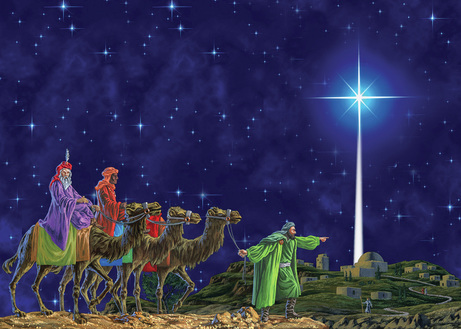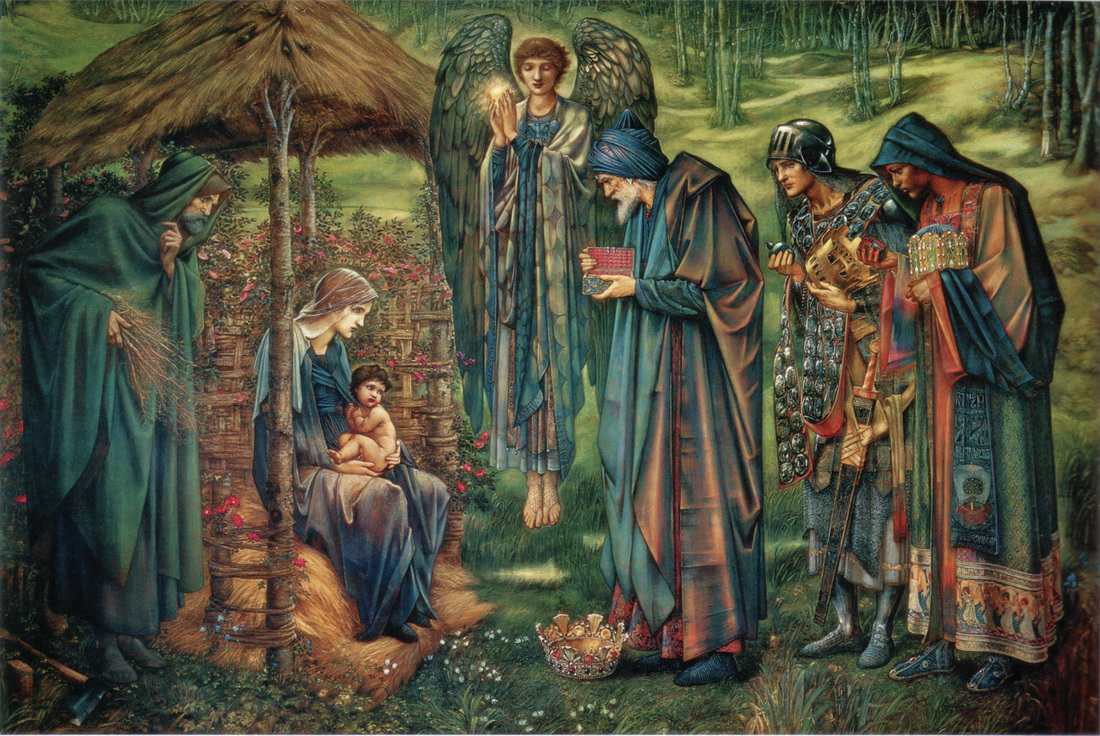
Wednesday was the Day of Epiphany, which this year ushers in 5 Sundays in Epiphany. What does Epiphany mean? What does it mean to us? What should it mean to us? In the non-liturgical church, an “epiphany” is a bright idea, and the word itself brings nothing to mind other than perhaps something those “high church” people observe. But even for the Liturgical Church, the true meaning of Epiphany as the manifestation of Christ to the Gentiles often may be lost in images and legends that obscure its significance.
We all have a special fascination with those mysterious sages whose visit to Bethlehem gives Epiphany its name. Yet we hardly know anything at all about them. We don’t even know how many of them there were, though they did show up with three highly symbolic gifts. We know that they came from somewhere in “the East,” but we don’t know their names, we have no idea how they happened to be more astute students of Hebrew prophecy than persons living in Israel at the time, and we don’t know how it was that only they noticed the star and recognized it as His star, the star of the “King of the Jews,” One Whom they should come to worship. We know that they made their way to Bethlehem with a stop in Jerusalem when Herod asked where they were headed. And we know that they were warned in a dream to take a different route home. That’s it.
And that’s where the legends take over. Now we are surrounded by representations of these sages. We have decided that there were three of them plus a page, we have made them kings, we have given them names: Caspar, Melchior and Balthazar and we even have decided that one of them was black. All over Europe their initials appear on lintels of homes and businesses, and often these writings in chalk remain visible throughout the entire year until only the date needs to be changed in the following January. Is this why we celebrate Epiphany? Is this why it’s a season of the Church year? Yes, that’s part of it; but at times the story may do more to obscure the meaning than to explicate it.
Pentecost is the festival that we call the “birthday” of the Church, but I tend to think of Epiphany as a festival that almost equally deserves to be called our birthday as the Church of Jesus Christ. It is the day that first reveals what Paul called “the musterion,” the Mystery of Christ. Yes, there is the general sense in Paul’s writings that the “Mystery of Christ” is the same as our Memorial Acclamation, the “mystery of faith:” “Christ has died, Christ is risen, Christ will come again.” But for Paul, the “Mystery of Christ” was inseparably related to his unparalleled Damascus Road encounter with the risen Christ and his special calling as apostle to the Gentiles. Peter had a glimpse of this in his mission to Cornelius and the vision that preceded it, but the special ministry to the Gentiles was left uniquely to Paul and his missionary companions.
This is an essential aspect of the Mystery of Christ: that in the redemptive work of Christ, salvation is now freely extended to the Gentiles quite apart from any connection to Judaism. We may wish to celebrate our Jewish roots, and this is a good thing we should continue to do. But in Christ, we are now brought into a privileged relationship with God that previously came only through identification with God’s chosen people.
All of this is what the arrival of these sages from the East prefigures. They came out of nowhere and receded into nowhere, never again to be heard from, yet forever to be remembered. The very thought of them is a blessing to us and, by a long-standing tradition, a blessing to our homes. They came from some unnamed Eastern land seeking the Jewish Messiah, the Christ, the King; what they found was a baby in humble surroundings, not at all what they must have been expecting. But they, along with a motley group of shepherds on the night shift, were the first and presumably only ones to visit Jesus, Mary and Joseph while acknowledging Jesus as the Christ Child. Soon the Holy Family would be off to Egypt to escape Herod’s “Slaughter of the Innocents” and to fulfill the prophecy of Hosea, “Out of Egypt have I called My Son” (Hos. 11:1, Mt. 2:15).
Epiphany celebrates this visit of the sages. It’s a small pericope in the story of Jesus, but far from an insignificant one. It announces that the reach of God is now extended to all of humankind, to Jew and Gentile alike. The point is made powerfully, in that Gentile sages were allowed to be among the very first persons to greet Messiah’s arrival and to recognize Who He really was. The very nature of their gifts may speak symbolically of this recognition as well as prophetically of what was yet to come in Jesus’ life. Gold spoke of Jesus’ Kingship and Deity; frankincense spoke of His Priestly function and His holiness; myrrh foreshadowed His role as the Suffering Servant and His sacrificial death on the Cross. Collectively, these costly and even extravagant gifts further underscore the sense of the sages that they were bearing treasures for the King of Kings.
In addition to the legends and traditions that have accumulated in conjunction with these sages, many of our most beloved Christmas and Epiphany hymns expand on their appearance in profoundly devotional ways. A personal favorite despite its frequently maligned seasonal reference is “In the Bleak Midwinter” with its text by Christina Rossetti. In reference to the gifts of the sages, it asks the question,
“What can I give Him, poor as I am?
If I were a shepherd, I would bring a lamb;
if I were a Wise Man, I would do my part;
yet what I can I give Him: give my heart.”
He asks no greater gift than this, the gift that every one of us is able to bring regardless of our economic standing. In fact it is a gift that has no limits at all other than our reluctance to surrender to its comprehensive requirements. Giving one’s heart clearly implies the giving of one’s entire self, a gift that pleases God more than any other gift; yet it is one that makes significant demands on our selves. Whatever service or sacrifice it may be that God is requiring of us, it is bundled together with the gift of our hearts. May we be ready today and each day to discover what God wishes to do with our gift and willingly, no, eagerly to offer it to Him without reservation. After all, the gifts of God for the people of God come without measure and without reservation. Amen.
"What Child Is This?" lyrics
(William Chatterton Dix, published ca. 1865)
What Child is this, who laid to rest,
On Mary's lap is sleeping?
Whom angels greet with anthems sweet
While shepherds watch are keeping?
This, this is Christ the King
Whom shepherds guard and angels sing.
Haste, haste to bring Him laud,
The Babe, the Son of Mary.
Why lies He in such mean estate
Where ox and ass are feeding?
Good Christian, fear: for sinners here,
The silent Word is pleading.
This, this is Christ the King
Whom shepherds guard and angels sing.
Haste, haste to bring Him laud,
The Babe, the Son of Mary.
So bring Him incense, gold and myrrh;
Come peasant, king to own Him.
The King of Kings salvation brings;
Let loving hearts enthrone Him.
This, this is Christ the King
Whom shepherds guard and angels sing.
Haste, haste to bring Him laud,
The Babe, the Son of Mary.

 RSS Feed
RSS Feed


